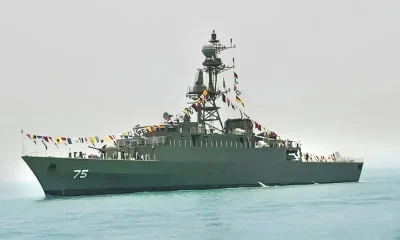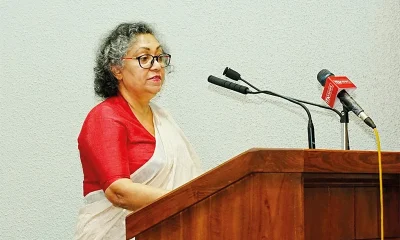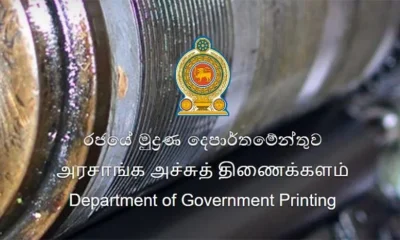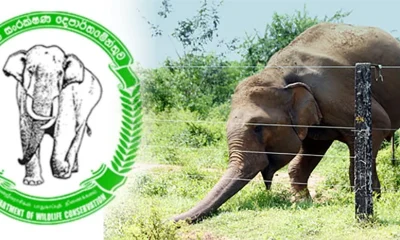Midweek Review
first major political crisis since 2019 prez poll
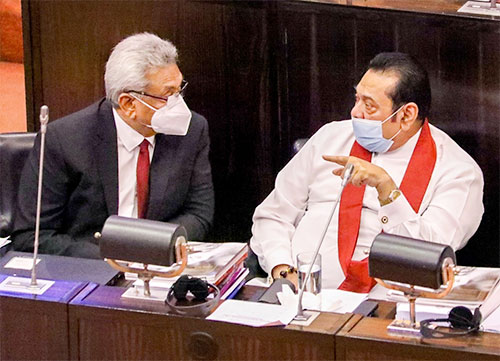
President Gotabaya Rajapaksa and Premier Mahinda Rajapaksa in conversation in Parliament on Feb 11, 2021. It was President Gotabaya Rajapaksa’s fourth visit to Parliament since the inauguration of the new session (pic courtesy PMD)
By Shamindra Ferdinando
National Freedom Front (NFF) leader, Wimal Weerawansa, MP, recently caused quite a political storm by calling for the inclusion of President Gotabaya Rajapaksa in Sri Lanka Podujana Peramuna (SLPP) decision-making hierarchy. In spite of efforts to settle the issue, amicably, strong statements made by SLPP Chairman Prof. G.L. Peiris and its General Secretary Sagara Kariyawasam at the regular weekly media briefing at Waters’ Edge underscored the simmering problem (report on media briefing on page 1)
Weerawansa’s call triggered an extremely angry response from the ruling SLPP with its General Secretary Sagara Kariyawasam lambasting the former JVPer. Flanked by Kalutara District SLPP MP Sanjiva Edirimanne and SLPP Administrative Secretary Renuka Perera, Attorney-at-Law Kariyawasam dismissed Weerawansa’s call.
The briefing at the SLPP Nelum Mawatha Office, Battarmulla, revealed unprecedented deep resentment towards Weerawansa whose unexpected appeal took the SLPP by total surprise. Newcomers Kariyawasam, a National List MP and Edirimanne, who polled 105,973 preference votes in the Kalutara district at the last parliamentary election in August 2020, teamed up with Perera. The SLPP ‘blitz’ shook the political scene.
The SLPP primarily targeted Weerawansa on two issues, namely the NFF leader had no right whatsoever to call for removal of SLPP leader Prime Minister Mahinda Rajapaksa and the NFF maintained clandestine links with two foreign intelligence agencies.
A section of the media thrived on the unexpected political controversy caused by Weerawansa. The former JVP Propaganda Secretary couldn’t have made that call without realizing the far reaching consequences. Those seeking to exploit the SLPP-NFF dispute tried to capitalise on the situation. The SLPP, too, contributed to that strategy. In its haste to attack Weerawansa over his interview with the Lankadeepa in its Feb 7, 2021 edition, the SLPP forgot the NFF leader wanted a specific political role for President Gotabaya Rajapaksa.
Does President Gotabaya Rajapaksa require a political role? Does he deserve such a role? Can President Rajapaksa be denied a leadership role in the SLFP, undoubtedly the most powerful political party today? Can Gotabaya Rajapaksa ‘operate’ outside the SLPP, thereby depriving him an opportunity to intervene in political matters?
Media ‘blitz’
The SLPP’s drastic response to Weerawansa’s timely suggestion underscored President Gotabaya Rajapaksa lacking much needed political clout. Over a year after the last presidential election in Nov 2019, President Gotabaya Rajapaksa remained a man without SLPP membership. In fact, the SLPP on its own should have considered how to accommodate President Gotabaya Rajapaksa. Had the SLPP acted wisely, Weerawansa wouldn’t have had to risk a preventable political crisis. The SLPP actually owed an explanation why it failed to consider a suitable position within the hierarchy. It would be pertinent to mention that Weerawansa secured two other interviews on Feb 7, the day the Lankadeepa published the controversial discussion. Mawbima, published by the Ceylon Newspapers Pvt Limited owned by SLPP National List MP Tiran Alles and Communist Party mouthpiece, ‘Aththa’ (Truth), a name borrowed from the former official Soviet CP newspaper Pravda.
The writer found the Aththa interview conducted by its Editor (name not given) quite critical of the incumbent Rajapaksa administration. In fact, Weerawansa therein asserted that there had been much better internal discussion within the SLFP-led coalition during the previous Rajapaksa presidency (Nov 2005-January 2015). There had been no reference to President Gotabaya Rajapaksa being given a political role whatsoever. The NFF leader who spearheaded a campaign within the SLPP against the hotly disputed government decision to hand over to India 49 per cent stake in the East Container Terminal (ECT) at the Colombo port, in Feb 3, 2021 sought to explain the common stand taken by some parties within the SLPP. Instead, Weerawansa created an enormous political issue that overwhelmed the ruling coalition.
Perhaps, someone should remind Weerawansa how he fired the first salvo against the previous Rajapaksa administration by seeking a consensus with the late Ven. Maduluwawe Sobitha. The meeting in the second week of July 2014 set in motion a spate of events leading to SLFP General Secretary Maihripala Sirisena switching allegiance to UNP leader Ranil Wickremesinghe.
Attack on influential clique
Responding to an Aththa query, Weerawansa explained the weaknesses in the SLPP. Alleging the absence of a regular discussion among constituents of the SLPP, Weerawansa said that though all contributed to the overwhelming victories at the 2019 and 2020 national elections, today a small clique sustained the power. When the actions of that clique caused trouble, the administration sought the help of all others to face the crisis. Declaring he had made his position clear on the extremely unhappy situation, Weerawansa alleged that the government suffered due to lack of internal discussions. Compared to the situation today, the previous Rajapaksa administration handled internal issues better. The views expressed at that time received some recognition. The absence of internal discussions had resulted in challenges to the incumbent administration.
Asked to comment on some SLPP constituents taking a common stand on the ECT issue leading to the SLPP targeting the NFF leader, Weerawansa said that representatives, including lawmakers met at his official residence on January 30, 2021, to take a common stand on the issue at hand. Altogether 10 political parties had participated in the discussion and, at the conclusion, they decided to continue with the grouping. “We decided to meet once a month to discuss developments. Discuss required changes. Discuss the government strategies,” Weerawansa said, revealing they reached a common understanding meant to bring both the government and the country under pressure. The Minister declared that at that time they met to discuss ECT exclusively, subsequently a decision was made to continue with the project. Weerawansa said that they would try to obstruct those trying to take President Gotabaya Rajapaksa on a wrong path.
Weerawansa, in his interview with Aththa, emphasised how the Western powers went even to the extent of exploring the imposition of economic sanctions on Sri Lanka against the backdrop of the 46th session of the Geneva-based United Nations Human Rights Council (UNHRC) at a time the country was mired in a deepening crisis due to rising foreign debt. Weerawansa didn’t mince his words when he acknowledged daunting economic challenges and the failure on the part of the government to achieve the much-touted economic objectives. Weerawansa blamed the Covid-19 pandemic mainly for the economic downturn. The former JVP heavyweight warned of dire consequences if the country couldn’t raise over USD 4 bn annually to settle loans obtained by successive governments, particularly the previous yahapalana administration taking commercial loans at high interest rates. Weerawansa alleged the UNP-SLFP administration went for excessively costly loans in the wake of their humiliating defeat at the last Local Government elections on Feb 10, 2018.
In other words, Weerawansa acknowledged that there couldn’t be any justification in ‘boru shows’ at a time of the rapidly developing crisis that could overwhelm the national economy. It would be the responsibility of the SLPP to ensure political stability both in and outside Parliament. An internal crisis within the SLPP now can cause irreparable damage.
Time for politics
Wartime Defence Secretary Gotabaya Rajapaksa entered active politics in the wake of the enactment of the 19th Amendment to the Constitution in 2015. The 19th Amendment deprived President Mahinda Rajapaksa of an opportunity to seek a third presidential term. One-time SLFP strongman and war-winning President Mahinda Rajapaksa failed in his hotly challenged bid to secure a third term in 2015. Having launched civil society groups Viyathmaga and Eliya at the onset of the yahapalana administration, Gotabaya Rajapaksa slowly but steadily pursued a political strategy that ultimately paved the way for him to secure the SLPP’s presidential nomination in August 2019. Yet, Gotabaya Rajapaksa didn’t publicly receive SLPP membership. Gotabaya Rajapaksa launched Viyathmaga in early 2016 to take his message to the masses. Viyathmaga was followed by Eliya that focused on countering moves to introduce a new Constitution at the expense of the country’s unitary status.
Viyathmaga emerged as an influential group within the SLPP parliamentary group with eight out of nine contestants gaining entry into Parliament at the August 2020 general election. The SLPP won 145 seats, including 17 National List slots. The Parliament comprises 196 elected and 29 appointed members.
Of the SLPP winners, retired Rear Admiral Sarath Weerasekera (328,092) and Dr. Nalaka Godahewa (325,479) polled the highest preferential votes in Colombo and Gampaha electoral districts, respectively. President Gotabaya Rajapaksa fielded the group on the SLPP ticket whereas former Central Bank Governor Ajith Nivard Cabraal and Dr. Seetha Arambepola were accommodated on the National List.
Of the successful Viyathmaga members, only Weerasekera has represented Parliament before having served the Navy for over three decades and retired as its Chief of Staff. Weerasekera represented Digamadulla electorate during Mahinda Rajapaksa’s second tenure (2010-2015) as the President.
Viyathmaga nominees Prof. Channa Jayasumana (Anuradhapura/133,980), Gunapala Ratnasekera (Kurunegala/141,991), Nalaka Kottegoda (Matale/71,404), Tilak Rajapaksha (Digamadulla/54,203), Dr. Upul Galappatti (Hambantota/63,369), and Udayana Kirindigoda (Mahanuwara/39,904) entered Parliament at the expense of those who represented the last Parliament on the UPFA ticket.
Viyathmaga nominated Businessman Anura Fernando who nursed Colombo (north) electorate failed to get elected, whereas Ali Sabri, PC, who also served Viyathmaga, was accommodated in Parliament through the SLPP National List and not as a member of Viyathmaga.
Can the SLPP continue to ignore the need to bring in President Gotabaya Rajapaksa, formally into the decision- making apparatus of the SLPP?
Mahinda Rajapaksa switched his allegiance from the SLFP to the SLPP less than two weeks after the constitutional coup staged by the then President Maithripala Sirisena in late Oct 2018. Mahinda Rajapaksa received membership on Nov 11, 2018 from SLPP Chairman Prof. G.L. Peiris in the presence of its General Secretary Sagara Kariyawasam. The well attended event took place at Premier Rajapaksa’s official residence at Wijerama Mawatha. Thirty other UPFA lawmakers received SLPP membership on that day.
MR takes SLPP membership
Mahinda Rajapaksa made the surprising move, close on the heels of the Supreme Court suspending President Sirisena’s decision to dissolve Parliament on the night of Nov 9, 2018, and called the general election on January 5, 2019. Sirisena had no other option after the then Joint Opposition and SLFP failed pathetically to prove a simple majority in Parliament. Violence caused by the Joint Opposition in Parliament didn’t serve any purpose other than to bring the entire parliamentary system to disrepute.
The Supreme Court issued its ruling on Nov 14, 2018. Among those who moved the Supreme Court were the UNP, TNA and the JVP. A jubilant UNP leader Ranil Wickremesinghe, while hailing the Court ruling, tweeted that the people have won their first victory. “Let’s go forward and re-establish the sovereignty of the people in our beloved country.”
If the SC ruling went against those who moved the Court, perhaps the political situation would have been much different today. The political situation would have been fashioned on the outcome of the January 5, 2019 general election. Perhaps, the UNP on its own could have secured the largest block of seats in Parliament and form a government with the support of a section of SLFP lawmakers with or without Sirisena. In the last Parliament the UNP had 106 elected under the ‘Elephant’ symbol. The January 5, 2019 general election would have thwarted a disastrous split in the UNP a year later that ultimately led to annihilation of the UNP at the August 2020 general election. The UNP managed to secure just one National List slot. It would be pertinent to examine whether the National Thowheed Jamaat (NTJ) resorted to the Easter Sunday carnage on April 21, 2019 if the general election was held on January 5, 2019 as envisaged by President Sirisena.
Top academic Rajan Hoole speculated in his immensely interesting and controversial ‘Sri Lanka’s Easter Tragedy: When the Deep State Gets Out Of Its Depth’ launched in the run-up to the 2019 Nov presidential election how the failure on the part of the NTJ to secure parliamentary representation at the 2015 general election may have led to the Easter Sunday attacks. If general election was held as President Sirisena wanted the NTJ would have had an opportunity to secure some of its people elected to Parliament via Muslim political parties. Had that happened, perhaps it wouldn’t have resorted to the Easter Sunday attacks, he reasoned.
Who knows spice merchant Mohamed Yusuf Ibrahim whose sons detonated explosives at the Shangri-La and the Cinnamon Grand hotels on April 21 would have found a place in the Parliament. The JVP never explained why Ibrahim was accommodated on its National List at the 2015 general election.
Ibrahim’s sons — identified as Ilham Ahmed Ibrahim and Imsath Ahmed Ibrahim —detonated their explosives at the Shangri-La and the Cinnamon Grand hotels, respectively.
Gotabaya Rajapaksa’s emergence as the SLPP presidential candidate should be examined against the backdrop of an extremely sensitive political environment following the Easter Sunday carnage. The UNP, the SLFP, JVP, TNA and all political parties represented in Parliament played politics with the issue. A naïve government allowed extremists to go on the rampage weeks after the Easter attacks. The failure to protect the Muslims is definitely as bad as allowing the NTJ to strike in spite of specific warnings received from India. The government never explained how extremists stormed Minuwangoda in the second week of May, 2019. The then Army Commander Lt. Gen. Mahesh Senanayake, having failed to prevent the Easter Sunday attacks and anti-Muslim violence, exploited the situation to seek a political career. The Army Commander, too, should have been held responsible for both failures as he also had at his disposal one of the country’s biggest intelligence operations run by the DMI. Senanayake who couldn’t even secure 50,000 votes at the last presidential election, contrary to much publicized promises, refrained from contesting the last parliamentary election. Perhaps he reslised that he had already been badly exposed.
19 A paves the way for GR
If not for the 19th Amendment, Gotabaya Rajapaksa wouldn’t have received SLPP nomination even though a significant section of the electorate appreciated the wartime Defence Secretary’s entry into politics at the highest level. Lawmakers Kumara Welgama, an SLFP heavyweight and Democratic Left Front (DLF) leader Vasudeva Nanayakkara opposed Gotabaya Rajapaksa’s entry. Welgama had the strength not only to take a public stand against Gotabaya Rajapaksa’s emergence as the SLPP candidate but switched his allegiance to the newly formed Samagi Jana Balavegaya (SJB) at the parliamentary election. Welgama entered Parliament from Kalutara.
In utterly appalling Sri Lankan politics, the country shouldn’t be surprised to see the bankrupt SJB and the JVP trying to exploit Weerawansa’s declaration. State Minister Ajith Nivard Cabrral recently reminded the real status of the SJB. Responding to SJB leader Sajith Premadasa’s query on the Katuwana branch of the Bank of Ceylon granting D.S. Gunasekera Company Rs 3.1 bn loan, a smiling former Central Bank Governor asked Premadasa where was he when the BOC subsequent to the then government’s intervention granted the Perpetual Treasuries Limited (PTL) a staggering Rs 10 bn in 10 minutes.
Premadasa formed the SJB after losing to Gotabaya Rajapaksa at the last presidential poll. A section of the civil society in a shameless bid, obviously on behalf of the UNP, moved the judiciary against Gotabaya Rajapaksa claiming he was not eligible to contest. A highly jittery SLPP fielded the then UPFA MP Chamal Rajapaksa as an independent candidate in case Gotabaya Rajapaksa suffered an unthinkable setback. The judiciary ruled in favour of Gotabaya Rajapaksa and the rest is history.
The government tackled the crisis caused by Weerawansa’s intervention. Tourism Minister Prasanna Ranatunga visited the ‘Made in Sri Lanka exhibition’ on Feb 12 on Minister Weerawansa’s invitation where he declared the issue has been settled while issuing a warning to smaller parties. On the following day, Premier Mahinda Rajapaksa visited the exhibition on Weerawansa’s invitation as the top leadership sought to settle the dispute. The SLPP initially hit back hard by calling a media briefing at Ape Gama on Feb 11 where Sanjiva Edirimanna, MP and several others strongly opposed the NFF’s intervention in what they called an internal matter. The government needs to examine contentious matters seriously. In addition to Weerawansa’s stand on the ECT and comment on the SLPP leadership, the former JVP firebrand clashed with the SLPP over the original 20th Amendment as well as an alleged attempt to influence NFF lawmakers. The clash between Weerawansa and SLPP National List MP Jayantha Ketagoda in Premier Rajapaksa’s presence in Parliament highlighted the torrid relationship between the two parties. Obviously all is not well within the ruling coalition. Those who exercised their franchise for the SLPP in 2019 and 2020 expect the ruling coalition to address internal issues, swiftly and decisively or be ready to face the consequences.
Midweek Review
At the edge of a world war
In September 1939, as Europe descended once more into catastrophe, E. H. Carr published The Twenty Years’ Crisis. Twenty years had separated the two great wars—twenty years to reflect, to reconstruct, to restrain. Yet reflection proved fragile. Carr wrote with unsentimental clarity: once the enemy is crushed, the “thereafter” rarely arrives. The illusion that power can come first and morality will follow is as dangerous as the belief that morality alone can command power. Between those illusions, nations lose themselves.
His warning hovers over the present war in Iran.
The “thereafter” has long haunted American interventions—after Afghanistan, after Iraq, after Libya. The enemy can be dismantled with precision; the aftermath resists precision. Iran is not a small theater. It is a civilization-state with a geography three times larger than Iraq. At its southern edge lies the Strait of Hormuz, narrow in width yet immense in consequence. Geography does not argue; it compels.
Long before Carr, in the quiet anxiety of the eighteenth century, James Madison, principal architect of the Constitution, warned that war was the “true nurse of executive aggrandizement.” War concentrates authority in the name of urgency. Madison insisted that the power to declare war must rest with Congress, not the president—so that deliberation might restrain impulse. Republics persuade themselves that emergency powers are temporary. History rarely agrees.
Then, at 2:30 a.m., the abstraction becomes decision.
Donald Trump declares war on Iran. The announcement crosses continents before markets open in Asia. Within twenty-four hours, Ali Khamenei, who ruled for thirty-seven years, is killed. The President calls him one of history’s most evil figures and presents his death as an opening for the Iranian people.
In exile, Reza Pahlavi hails the moment as liberation. In less than forty-eight hours, the Islamic Revolutionary Guard Corps collapses under overwhelming air power. A regime that endured decades falls swiftly. Military efficiency appears absolute. Yet efficiency does not resolve legitimacy.
The joint strike with Israel is framed as necessary and pre-emptive. Retaliation follows across the Gulf. The architecture of energy trade becomes fragile. Shipping routes are recalculated. Markets respond before diplomacy finds its language.
It is measured in the price of petrol in Colombo. In the bus fare in Karachi. In the rising cost of cooking gas in Dhaka. It is heard in the anxious voice of a migrant worker in Doha calling home to Kandy, asking whether contracts will be renewed, whether flights will continue, whether wages will be delayed. It is calculated in foreign reserves already strained, in currencies that tremble at rumor, in budgets forced to choose between subsidy and solvency.
Zaara was the breadwinner of her house in Sri Lanka. Her husband had been unemployed for years. At last, he secured an opportunity to travel to Israel as a foreign worker—like many Sri Lankans who depend on employment in the Middle East. It was to be their turning point: a small house repaired, debts reduced, dignity restored.
Now she lowers her eyes when she speaks. For Zaara, geopolitics is not theory. It is fear measured in distance—between a construction site abroad and a village waiting at home.
The war in Iran has shattered calculations that once felt practical. Nations like Sri Lanka now require strategic foresight to navigate unfolding realities. Reactive responses—whether to natural disasters or external shocks like this conflict—can cripple economies far faster than gradual pressures. Disruptions to energy imports, migrant remittances, and foreign reserves show how distant wars ripple into daily lives.
War among great powers is debated in think tanks. Its consequences are lived in markets—and in quiet kitchens where uncertainty sits heavier than hunger.
The conflict does not unfold in isolation. It enters the strategic calculus of China and Russia, both attentive to precedent. Power projected beyond the Western hemisphere reshapes perceptions in the Eastern theater. Iran’s transformation intersects directly with broader alignments. In 2021, Beijing and Tehran signed a twenty-five-year strategic agreement. By 2025, China was purchasing the majority of Iran’s exported oil at discounted rates. Energy underwrote strategy. That continuity has been disrupted. Yet strategic relationships do not vanish; they adjust.
In Winds of Change, my new book, I reproduce Nicholas Spykman’s 1944 two-theater confrontation map—Europe and the Pacific during the Second World War. Spykman distinguished maritime power from amphibian projection. Control of the Rimland determined balance. Then, the United States fought across two vast theaters. Today, Europe remains unsettled through Ukraine, the Pacific simmers over Taiwan and the South China Sea, Latin America remains sensitive, and the Middle East has been abruptly transformed. The architecture of multi-theater tension reappears.
At this juncture, the reflections of Marwan Bishara acquire weight. America’s ultimate power, he argues, resides in deterrence, not in the habitual use of force. Power, especially when shared, stabilizes. Force, when used with disregard for international law, breeds instability and humiliation. Arrogance creates enemies and narrows judgment. It is no surprise that many Americans themselves believe the United States should not act alone.
America’s strength does not rest solely in its military reach. Its economy constitutes roughly one-third of global output and generates close to 40 percent of the world’s research and development. Structural power—economic, technological, institutional—has historically underwritten deterrence. When force becomes the primary instrument, influence risks becoming coercion.
The United States now confronts simultaneous pressures across continents. The Second World War demonstrated the capacity to sustain multi-theater engagement; the post-9/11 wars revealed the exhaustion that follows prolonged intervention. Iran, larger and geopolitically deeper, presents a scale that cannot be resolved by air power alone.
Carr’s “thereafter” waits patiently. Military victory may be swift; political reconstruction is slow. Bishara reminds us that deterrence sustains stability, while force risks unraveling it.
At the edge of a potential world war, the decisive question is not who strikes first, but who restrains longest.
History watches. And in places far from the battlefield, mothers wait for phone calls that may not come.
Asanga Abeyagoonasekera is a Senior Research Fellow at the Millennium Project, Washington, D.C., and the author of Winds of Change: Geopolitics at the Crossroads of South and Southeast Asia, published by World Scientific
Midweek Review
Live Coals Burst Aflame

Live coals of decades-long hate,
Are bursting into all-consuming flames,
In lands where ‘Black Gold’ is abundant,
And it’s a matter to be thought about,
If humans anywhere would be safe now,
Unless these enmities dying hard,
With roots in imperialist exploits,
And identity-based, tribal violence,
Are set aside and laid finally to rest,
By an enthronement of the principle,
Of the Equal Dignity of Humans.
By Lynn Ockersz
Midweek Review
Saga of the arrest of retired intelligence chief
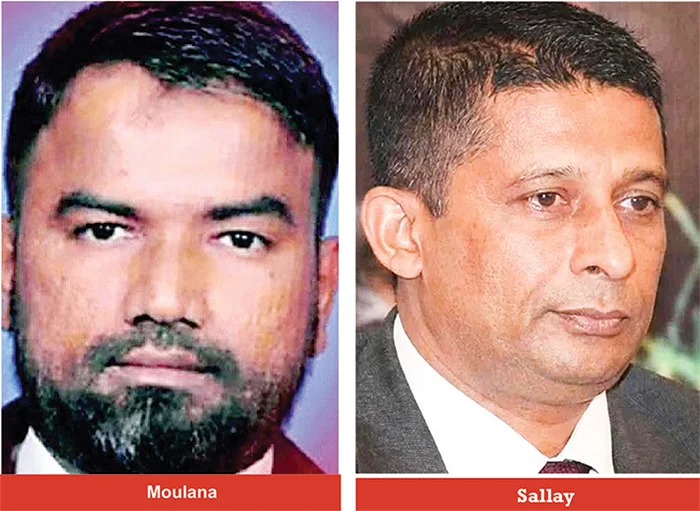
Retired Maj. Gen. Suresh Sallay’s recent arrest attracted internatiattention. His long-expected arrest took place ahead of the seventh anniversary of the bombings. Multiple blasts claimed the lives of nearly 280 people, including 45 foreigners. State-owned international news television network, based in Paris, France 24, declared that arrest was made on the basis of information provided by a whistleblower. The French channel was referring to Hanzeer Azad Moulana, who earlier sought political asylum in the West and one-time close associate of State Minister Sivanesathurai Chandrakanthan aka Pilleyan. May be the fiction he wove against Pilleyan and others may have been to strengthen his asylum claim there. Moulana is on record as having told the British Channel 4 that Sallay allowed the attack to proceed with the intention of influencing the 2019 presidential election. The French news agency quoted an investigating officer as having said: “He was arrested for conspiracy and aiding and abetting the Easter Sunday attacks. He has been in touch with people involved in the attacks, even recently.”
****
Suresh Sallay of the Directorate of Military Intelligence (DMI) received the wrath of Yahapalana Prime Minister Ranil Wickremesinghe, in 2016, over the reportage of what the media called the Chavakachcheri explosives detection made on March 30, 2016. Premier Wickremesinghe found fault with Sallay for the coverage, particularly in The Island. Police arrested ex-LTTE child combatant Edward Julian, alias Ramesh, after the detection of one suicide jacket, four claymore mines, three parcels containing about 12 kilos of explosives, to battery packs and several rounds of 9mm ammunition, from his house, situated at Vallakulam Pillaiyar Kovil Street. Chavakachcheri police made the detection, thanks to information provided by the second wife of Ramesh. Investigations revealed that the deadly cache had been brought by Ramesh from Mannar (Detection of LTTE suicide jacket, mines jolts government: Fleeing Tiger apprehended at checkpoint, The Island, March 31, 2016).
The then Jaffna Security Forces Commander, Maj. Gen. Mahesh Senanayake, told the writer that a thorough inquiry was required to ascertain the apprehended LTTE cadre’s intention. The Chavakachcheri detection received the DMI’s attention. The country’s premier intelligence organisation meticulously dealt with the issue against the backdrop of an alleged aborted bid to revive the LTTE in April 2014. Of those who had been involved in the fresh terror project, three were killed in the Nedunkerny jungles. There hadn’t been any other incidents since the Nedunkerny skirmish, until the Chavakachcheri detection.
Piqued by the media coverage of the Chavakachcheri detection, the Sirisena-Wickremesinghe administration tried to silence the genuine Opposition. As the SLFP had, contrary to the expectations of those who voted for the party at the August 2015 parliamentary elections, formed a treacherous coalition with the UNP, the Joint Opposition (JO) spearheaded the parliamentary opposition.
The Criminal Investigation Department (CID) questioned former External Affairs Minister and top JO spokesman, Prof. G.L. Peiris, over a statement made by him regarding the Chavakachcheri detection. The former law professor questioned the legality of the CID’s move against the backdrop of police declining to furnish him a certified copy of the then acting IGP S.M. Wickremesinghe’s directive that he be summoned to record a statement as regards the Chavakachcheri lethal detection.
One-time LTTE propagandist Velayutham Dayanidhi, a.k.a. Daya Master, raised with President Maithripala Sirisena the spate of arrests made by law enforcement authorities, in the wake of the Chavakachcheri detection. Daya Master took advantage of a meeting called by Sirisena, on 28 April, 2016, at the President’s House, with the proprietors of media organisations and journalists, to raise the issue. The writer having been among the journalists present on that occasion, inquired from the ex-LETTer whom he represented there. Daya Master had been there on behalf of DAN TV, Tamil language satellite TV, based in Jaffna. Among those who had been detained was Subramaniam Sivakaran, at that time Youth Wing leader of the Illankai Thamil Arasu Kadchi (ITAK), the main constituent of the now defunct Tamil National Alliance. In addition to Sivakaran, the police apprehended several hardcore ex-LTTE cadres (LTTE revival bid confirmed: TNA youth leader arrested, The Island April 20, 2016).
Ranil hits out at media
Subsequent inquiries revealed the role played by Sivakaran in some of those wanted in connection with the Chavakachcheri detection taking refuge in India. When the writer sought an explanation from the then TNA lawmaker, M.A. Sumanthiran, regarding Sivakaran’s arrest, the lawyer disowned the Youth Wing leader. Sumanthiran emphasised that the party suspended Sivakumaran and Northern Provincial Council member Ananthi Sasitharan for publicly condemning the TNA’s decision to endorse Maithripala Sirisena’s candidature at the 2015 presidential election (Chava explosives: Key suspects flee to India, The Island, May 2, 2016).
Premier Wickremesinghe went ballistic on May 30, 2016. Addressing the 20th anniversary event of the Sri Lanka Muslim Media Forum, at the Sports Ministry auditorium, the UNP leader castigated the DMI. Alleging that the DMI had been pursuing an agenda meant to undermine the Yahapalana administration, Wickremesinghe, in order to make his bogus claim look genuine, repeatedly named the writer as part of that plot. Only Wickremesinghe knows the identity of the idiot who influenced him to make such unsubstantiated allegations. The top UNPer went on to allege that The Island, and its sister paper Divaina, were working overtime to bring back Dutugemunu, a reference to war-winning President Mahinda Rajapaksa. A few days later, sleuths from the Colombo Crime Detection Bureau (CCD) visited The Island editorial to question the writer where lengthy statements were recorded. The police were acting on the instructions of the then Premier, who earlier publicly threatened to send police to question the writer.
In response to police queries about Sallay passing information to the media regarding the Chavakachcheri detection and subsequent related articles, the writer pointed out that the reportage was based on response of the then ASP Ruwan Gunasekera, AAL and Sumanthiran, as had been reported.
Wickremesinghe alleged, at the Muslim media event, that a section of the media manipulated coverage of certain incidents, ahead of the May Day celebrations.
In early May 2016 Wickremesinghe disclosed that he received assurances from the police, and the DMI, that as the LTTE had been wiped out the group couldn’t stage a comeback. The declaration was made at the Lakshman Kadirgamar Institute for International Relations and Strategic Studies (LKIIRIS) on 3 May 2016. Wickremesinghe said that he sought clarifications from the police and the DMI in the wake of the reportage of the Chavakachcheri detection and related developments (PM: LTTE threat no longer exists, The Island, May 5, 2016).
The LTTE couldn’t stage a comeback as a result of measures taken by the then government. It would be a grave mistake, on our part, to believe that the eradication of the LTTE’s conventional military capacity automatically influenced them to give up arms. The successful rehabilitation project, that had been undertaken by the Rajapaksa government and continued by successive governments, ensured that those who once took up arms weren’t interested in returning to the same deadly path.
In spite of the TNA and others shedding crocodile tears for the defeated Tigers, while making a desperate effort to mobilise public opinion against the government, the public never wanted the violence to return. Some interested parties propagated the lie that regardless of the crushing defeat suffered in the hands of the military, the LTTE could resume guerilla-type operations, paving the way for a new conflict. But by the end of 2014, and in the run-up to the presidential election in January following year, the situation seemed under control, especially with Western countries not wanting to upset things here with a pliant administration in the immediate horizon. Soon after the presidential election, the government targeted the armed forces. Remember Sumanthiran’s declaration that the ITAK Youth Wing leader Sivakaran had been opposed to the TNA backing Sirisena at the presidential poll.
The US-led accountability resolution had been co-sponsored by the Sirisena-Wickremesinghe duo to appease the TNA and Tamil Diaspora. The Oct. 01, 2016, resolution delivered a knockout blow to the war-winning armed forces. The UNP pursued an agenda severely inimical to national interests. It would be pertinent to mention that those who now represent the main Opposition, Samagi Jana Balawegaya (SJB), were part of the treacherous UNP.
Suresh moved to Malaysia
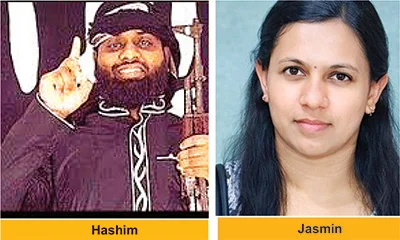 The Yahapalana leadership resented Sallay’s work. They wanted him out of the country at a time a new threat was emerging. The government attacked the then Justice Minister Dr. Wijeyadasa Rajapakshe, PC, who warned of the emerging threat from foreign-manipulated local Islamic fanatics on 11 Nov. 2016, in Parliament. Rajapakshe didn’t mince his words when he underscored the threat posed by some Sri Lanka Muslim families taking refuge in Syria where ISIS was running the show. The then government, of which he was part o,f ridiculed their own Justice Minister. Both Sirisena and Wickremesinghe feared action against extremism may cause erosion of Muslim support. By then Sallay, who had been investigating the deadly plot, was out of the country. The Yahapalana government believed that the best way to deal with Sallay was to grant him a diplomatic posting. Sally ended up in Malaysia, a country where the DMI played a significant role in the repatriation of Kumaran Pathmanathan, alias KP, after his arrest there.
The Yahapalana leadership resented Sallay’s work. They wanted him out of the country at a time a new threat was emerging. The government attacked the then Justice Minister Dr. Wijeyadasa Rajapakshe, PC, who warned of the emerging threat from foreign-manipulated local Islamic fanatics on 11 Nov. 2016, in Parliament. Rajapakshe didn’t mince his words when he underscored the threat posed by some Sri Lanka Muslim families taking refuge in Syria where ISIS was running the show. The then government, of which he was part o,f ridiculed their own Justice Minister. Both Sirisena and Wickremesinghe feared action against extremism may cause erosion of Muslim support. By then Sallay, who had been investigating the deadly plot, was out of the country. The Yahapalana government believed that the best way to deal with Sallay was to grant him a diplomatic posting. Sally ended up in Malaysia, a country where the DMI played a significant role in the repatriation of Kumaran Pathmanathan, alias KP, after his arrest there.
Having served the military for over three cadres, Sallay retired in 2024 in the rank of Major General. Against the backdrop of his recent arrest, in connection with the ongoing investigation into the 2019 Easter Sunday carnage, The Island felt the need to examine the circumstances Sallay ended up in Malaysia at the time. Now, remanded in terms of the Prevention of terrorism Act (PTA), he is being accused of directing the Easter Sunday operation from Malaysia.
Pivithuru Hela Urumaya leader and former Minister Udaya Gammanpila has alleged that Sallay was apprehended in a bid to divert attention away from the deepening coal scam. Having campaigned on an anti-corruption platformm in the run up to the previous presidential election, in September 2024, the Parliament election, in November of the same year, and local government polls last year, the incumbent dispensation is struggling to cope up with massive corruption issues, particularly the coal scam, which has not only implicated the Energy Minister but the entire Cabinet of Ministers as well.
The crux of the matter is whether Sallay actually met would-be suicide bombers, in February 2018, in an estate, in the Puttalam district, as alleged by the UK’s Channel 4 television, like the BBC is, quite famous for doing hatchet jobs for the West. This is the primary issue at hand. Did Sallay clandestinely leave Malaysia to meet suicide bombers in the presence of Hanzeer Azad Moulana, one-time close associate of State Minister Sivanesathurai Chandrakanthan, aka Pilleyan, former LTTE member?
The British channel raised this issue with Sallay, in 2023, at the time he served as Director, State Intelligence (SIS). Sallay is on record as having told Channel 4 Television that he was not in Sri Lanka the whole of 2018 as he was in Malaysia serving in the Sri Lankan Embassy there as Minister Counsellor.
Therefore, the accusation that he met several members of the National Thowheeth Jamaath (NTJ), including Mohamed Hashim Mohamed Zahran, in Karadipuval, Puttalam, in Feb. 2018, was baseless, he has said.
The intelligence officer has asked the British television station to verify his claim with the Malaysian authorities.
Responding to another query, Sallay had told Channel 4 that on April 21, 2019, the day of the Easter Sunday blasts, he was in India, where he was accommodated at the National Defence College (NDC). That could be verified with the Indian authorities, Sallay has said, strongly denying Channel 4’s claim that he contacted one of Pilleyan’s cadres, over, the phone and directed him to pick a person outside Hotel Taj Samudra.
According to Sallay, during his entire assignment in Malaysia, from Dec. 2016 to Dec. 2018, he had been to Colombo only once, for one week, in Dec. 2017, to assist in an official inquiry.
Having returned to Colombo, Sallay had left for NDC, in late Dec. 2018, and returned only after the conclusion of the course, in November 2019.
Sallay has said so in response to questions posed by Ben de Pear, founder, Basement Films, tasked with producing a film for Channel 4 on the Easter Sunday bombings.
The producer has offered Sallay an opportunity to address the issues in terms of Broadcasting Code while inquiring into fresh evidence regarding the officer’s alleged involvement in the Easter Sunday conspiracy.
The producer sought Sallay’s response, in August 2023, in the wake of political upheaval following the ouster of Gotabaya Rajapaksa, elected at the November 2019 presidential election.
At the time, the Yahapalana government granted a diplomatic appointment to Sallay, he had been head of the Directorate of Military Intelligence (DMI). After the 2019 presidential election, President Gotabaya Rajapaksa named him the Head of SIS.
The Basement Films has posed several questions to Sallay on the basis of accusations made by Hanzeer Azad Moulana.
In response to the film producer’s query regarding Sallay’s alleged secret meeting with six NTJ cadres who blasted themselves a year later, Sallay has questioned the very basis of the so called new evidence as he was not even in the country during the period the clandestine meeting is alleged to have taken place.
Contradictory stands
Following Sajith Premadasa’s anticipated defeat at the 2019 presidential election, Harin Fernando accused the Catholic Church of facilitating Gotabaya Rajapaksa’s victory. Fernando, who is also on record as having disclosed that his father knew of the impending Easter Sunday attacks, pointed finger at the Archbishop of Colombo, Rt. Rev Malcolm Cardinal Ranjith, for ensuring Gotabaya Rajapaksa’s victory.
Former President Maithripala Sirisena, as well as JVP frontliner Dr. Nalinda Jayathissa, accused India of masterminding the Easter Sunday bombings. Then there were claims of Sara Jasmin, wife of Katuwapitiya suicide bomber Mohammed Hastun, being an Indian agent who was secretly removed after the Army assaulted extremists’ hideout at Sainthamaruthu in the East. What really had happened to Sara Jasmin who, some believe, is key to the Easter Sunday puzzle.
Then there was huge controversy over the arrest of Attorney-at-Law Hejaaz Hizbullah over his alleged links with the Easter Sunday bombers. Hizbullah, who had been arrested in April 2020, served as lawyer to the extremely wealthy spice trader Mohamed Yusuf Ibrahim’s family that had been deeply involved in the Easter Sunday plot. Mohamed Yusuf Ibrahim had been on the JVP’s National List at the 2015 parliamentary elections. The lawyer received bail after two years. Two of the spice trader’s sons launched suicide attacks, whereas his daughter-in-law triggered a suicide blast when police raided their Dematagoda mansion, several hours after the Easter Sunday blasts.
Investigations also revealed that the suicide vests had been assembled at a factory owned by the family and the project was funded by them. It would be pertinent to mention that President Gotabaya Rajapaksa’s government never really bothered to conduct a comprehensive investigation to identify the Easter Sunday terror project. Perhaps, their biggest failure had been to act on the Presidential Commission of Inquiry (PCoI) recommendations. Instead, President Rajapaksa appointed a six-member committee, headed by his elder brother, Chamal Rajapaksa, to examine the recommendations, probably in a foolish attempt to improve estranged relations with the influential Muslim community. That move caused irreparable damage and influenced the Church to initiate a campaign against the government. The Catholic Church played quite a significant role in the India- and US-backed 2022 Aragalaya that forced President Rajapaksa to flee the country.
Interested parties exploited the deterioration of the national economy, leading to unprecedented declaration of the bankruptcy of the country in April 2022, to mobilie public anger that was used to achieve political change.
-

 Features3 days ago
Features3 days agoBrilliant Navy officer no more
-

 Opinion6 days ago
Opinion6 days agoJamming and re-setting the world: What is the role of Donald Trump?
-

 Features6 days ago
Features6 days agoAn innocent bystander or a passive onlooker?
-

 Opinion3 days ago
Opinion3 days agoSri Lanka – world’s worst facilities for cricket fans
-

 Business6 days ago
Business6 days agoAn efficacious strategy to boost exports of Sri Lanka in medium term
-

 Features4 days ago
Features4 days agoOverseas visits to drum up foreign assistance for Sri Lanka
-
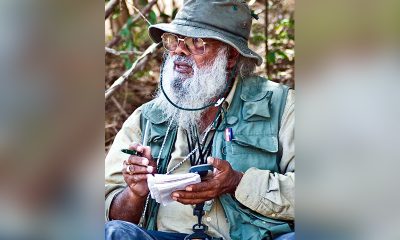
 Features4 days ago
Features4 days agoSri Lanka to Host First-Ever World Congress on Snakes in Landmark Scientific Milestone
-

 Features3 days ago
Features3 days agoA life in colour and song: Rajika Gamage’s new bird guide captures Sri Lanka’s avian soul






